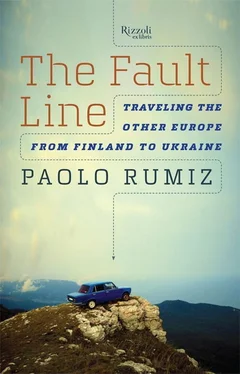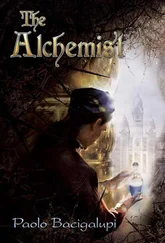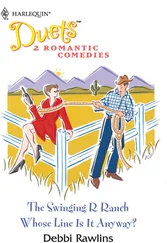Karelia—if you haven’t seen it, you can’t understand the essence of this frontier land of woods, lakes, and rivers, where the boat is the only sensible means of transport but which is the heart of an epic that left its mark on history, just like the epic Gilgamesh in Mesopotamia. In a town on the northern edge of our frontier, Voknavolok, there is an old woman by the name of Sandra Remshu, who is still able to sing the saga in the original language—the last of her kind, perhaps, in all of Karelia, Finland included.
I leaf through spellbinding pages of icons, gold leaf, lithographs in black and white, where Byzantium and the Great North, the Gothic and the Orient, are wed in a natural way: streamlined boats like dugout canoes gliding in the moonlight, fights to the death between warriors clad in animal skins, fires burning in the night, flaming sunsets, lakes, constellations, endless forests. I enter into a world where there is no division between land and water and maybe not even between life and death. In the Great North, the road you will take depends on the tracks you’ve left behind you in the snow. Everyone has his own path, the Sami say, and if you know how to find it, your passing into the other world will be imperceptible. The Arctic peoples, whom Wilk has known and described, believe that there is no difference between the world on this side and the one beyond, and that in both there are reindeer.
Here, too, in Karelia, where rivers, lakes, and gulfs form inextricable labyrinths with minimal changes of level, the separation between land and water, forest and open sea, is labile. On the Onega, the equation between moving from place to place and embarkation is so perfect that they don’t speak of “sailing” with the boat but of “going” with the boat. Instead of “building” a boat they speak of “sewing” a boat, in evocation of a sophisticated operation that was once executed almost magically, without nails. The bard in the saga of Kalevala , old man Väinämöinen, was before all else a builder of boats. Song and sailing, war and hunting in the woods, are the same thing in his epic. Pier Paolo Pasolini knew by heart the death of the hero Lemminkäinen, killed by a boy motivated by jealousy. It even seems that Pasolini carefully constructed his own violent death inspired by that thousand-year-old poem.
On the shores of Lake Onega, I come to understand a lot of things about the history of Russia: the voyage of the Scandinavian ships from the Baltic all the way to the area of Kiev; the naval power of Peter the Great built on the iron mines of Petrozavodsk; the epic of the Danish, Finnish, and Saxon carpenters and shipwrights who not only built the first large sailing ships of the empire of the czars, but prepared the way for their transport via land all the way to the White Sea and the Gulf of Finland, a mysterious itinerary that nobody has since been able to reconstruct; the descent of the Viking boats to the Black Sea, beyond the imperceptible watershed that separates it from the Baltic, in the land of diverging rivers known as Polesye; the pharaonic and obstinate foundation of Saint Petersburg at a cost of blood, sweat, and tears; and the attempt to Europeanize Russia, a world created on a different, irremediably Asiatic scale.
We are so enthusiastic about Mariusz’s library that he makes us a present of a precious “mini” edition of Kalevala with black-and-white wood engravings by Miod Miecew, a work of illustration that took eighteen years to complete. A little marvel, perfect for my backpack. But because on a journey lightness is everything, reciprocating a gift with a gift becomes a question of spatial economy and therefore of survival. Up to now, with every gift received, I’ve had to liberate myself of something. I received a smoked fish and I gave a knife. A handmade rosary replaced a salami; a little book on the Solovetsky Islands slipped into the space freed up by a map, by then no longer useful, of Norway. The whole meaning of life is contained in these renunciations of the non-indispensable. Here on the Onega, the epic of Kalevala demands an important eviction, and the choice is soon made. I give away my mosquito net, which will certainly be more useful to our two friends on the lake in the days of the parmak s, the vampire-insects of the North.
In Velikaya Guba, the explosive power of the brief Northern summer is concentrated in the beehives of Adel Dinislamovich Khasanov, a geologist who lives at No. 5, Street of the Geologists, a beekeeper born in the “land of beekeepers.” That’s the meaning of the name Bashkiria (in the modern Republic of Bashkortostan), a mysterious lost region in ex-Soviet Asia. For two months, from mid-June to mid-August, this man with a Turkish face and name doesn’t sleep, so he can take care of his bees. “Please excuse my disastrous garden,” he responds to our attempted approach, “but I don’t have time.” He has us rapidly don suits and protective hats with wide flaps and mosquito netting, then he asks us to follow him to a row of red and yellow beehives on the edge of the woods. Amid the neurotic buzzing of the worker bees, Adel almost has to shout to make himself heard. He uncovers the boxes one by one to make sure everything is in order.
“In Bashkiria the summer is long and it’s easier to work, even the bees are more relaxed. Here the ice doesn’t melt until the end of May, and the bees go at it like crazy to collect as much as they possibly can. By the time autumn comes, I believe they’re exhausted, as I am.” Adel searches inside one of the hives, practically dives in, and he can’t find the queen. He gets upset, then he spies her in a corner, next to a pile of royal jelly. He shows her to us. She looks to me like a fat slave girl in the middle of a harem. “I like my work, but there’s too much to do. I don’t have time even to notice that it’s summertime. In two months, if the season is good, I produce two thousand pounds of honey. I’ve got twenty-five hives and thirty thousand bees.”
“Today, they’re upset,” he adds. “They get this way when the weather changes. They’re meteoropathic animals,” and in fact they swarm together to form a cloud around our face nets, making a noise that sounds like a prolonged short circuit.
We go in the house to drink a bit of birch and raspberry tea with molasses. Adel puts a piece of wax and honey on the table, plus some bread with marmalade made from a forest fruit whose name we don’t understand. I ask him about bears, if they come near the house in search of some sweet honey. He says they come, and how!—and every time, it’s a problem. The bees fight back like mad; they defend themselves in every way possible. They are a strong race that holds out for a long time in winter. To be sure, it’s better for a man to meet a bear in the woods than a cloud of irate bees.
In the Slavic world, bees and bears are so intimately tied that around these parts—and not only these—bears have taken their name from honey. The word in the eleven time zones of the Slavic world is medvyed , and it comes from myod , which is the word for honey. The bear is a totemic beast in Russia and the surrounding countries. In 2001, when I was pedaling toward Istanbul with two friends on a beautiful ride through the Balkans, I met a tough-ass Ukrainian who was cycling around the Black Sea on a bike with a bearskin seat. It was all I could do not to genuflect like a Cheyenne before a medicine man or a totem pole.
So it’s medvyed from the Bering Strait to Slovenia. And because I hail from a city on the Slovenian border, which is the country with the highest density bear population in all of Europe, I’ve seen them a number of times on my cross-border jaunts in the countryside. One day, I tell the Bashkirian, I crossed the border on a bicycle heading toward the Isonzo River, and I stopped for a snack next to a truck that a Slovenian beekeeper had turned into a mobile beehive. When they retire, a lot of Slovenians outfit one of these hives-on-wheels and move their bees around according to the flowering periods of the various plants. I struck up a conversation with the man, who was taking the sun about thirty yards away from his self-propelled farm full of mountain honey, when we heard a loud noise and noticed that the truck was moving up and down. The door of the hive was open.
Читать дальше












